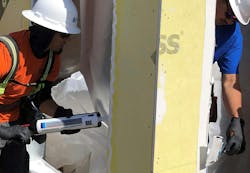Fenestration Alliance updates liquid applied flashing standard
The Fenestration and Glazing Industry Alliance (FGIA) published an update to its Liquid Applied Flashing Standard.
The document contains minimum performance requirements for liquid applied flashing used to provide water-resistive seals around exterior wall openings in buildings. This includes fenestration products such as windows and doors, as well as other through-wall penetrations.
“Liquid applied flashing products are realizing increasing application for sealing building interfaces, including flashing around windows and doors,” said Jim Katsaros, chair of the FGIA Flashing Committee. “These products offer many performance advantages, including outstanding adhesion to a wide variety of substrates, ultimate conformability for complex geometries and, in many cases, vapor permeable water-resistant seals.”
The standard is referenced in both the IRC and IBC Codes as a requirement for the use of these materials in window and door flashing applications.
